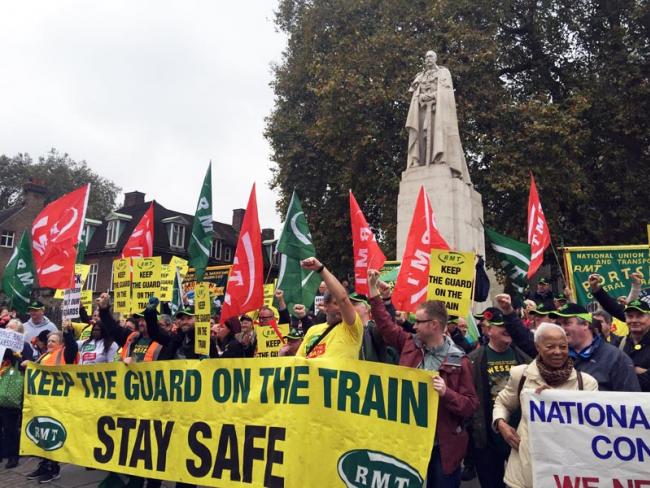29 December 2017

RMT protest outside parliament, 1 November 2016, calling for guards to be kept on trains. Photo Workers.
Disputes about staffing and pay are sweeping through the rail industry…
Strikes to halt the removal of guards continue on many passenger franchises. The RMT announced further strike action extending into the new year in the separate disputes on Merseyrail, Northern, Greater Anglia, South Western Railways and Island Line.
The West Yorkshire Combined Authority (WYCA) has backed the RMT’s campaign to keep guards on Northern’s trains. It is a key player in Rail North, the body that jointly oversees the Northern franchise with the Department for Transport. Indeed, not one council served by Northern supports driver only trains.
The chair of the combined authority’s transport committee, Keith Wakefield, said, “The West Yorkshire Combined Authority has supported RMT’s concern for passenger safety under the proposed driver only operation. Given the disruption to passengers we have urged that the Government intervenes to bring about a fair settlement like they have in Scotland, which gives assurances to vulnerable passengers.”
The agreement in Scotland guaranteed the role of the guard on new trains and resolved an early dispute with RMT over the issue. A similar settlement has been reached with the Welsh government.
Human shields
Labour politicians in Merseyside don’t see things the same way as they do in West Yorkshire. The RMT says the Merseyrail dispute could be easily resolved if senior politicians on Merseyside followed national Labour Party policy and supported the guards instead of acting as “human shields” for profiteering private rail companies.
The RMT’s dogged campaign against driver-only trains continues with the launch of a short film called called Unguarded showing the real effects of removing staff from railways.
The RMT seems to have shifted transport secretary Grayling into conceding he cannot stand in the way of its reaching deals to retain a second person. It remains to be seen whether the RMT feels able to give any ground over exactly what the second person on the train does.
‘The RMT needs to consider its tactical options carefully.’
The RMT has so far insisted on retaining the status quo. Its problem is that Southern has effectively managed to move away from the need for any second crew member on all occasions. Other companies may be able to force the issue to that point too. The RMT needs to consider its tactical options carefully to achieve its strategic aim of stopping the spread of driver-only train operation.
Pay
Virgin West Coast offered its staff a 3.2 per cent pay increase, broadly in line with other train operating company pay deals. But it then decided to pay its train drivers another 5.9 per cent. This was mostly justified by increased productivity, but about 0.9 per cent was to buy out a claim for a shorter working week.
Not surprisingly TSSA, representing white collar workers, and the RMT pointed out that they too had outstanding claims for a shorter working week, and they should receive 0.9 per cent as well as the drivers.
Virgin refused to budge. Incensed RMT and TSSA members voted overwhelmingly for strikes. The first, on 15 December, was solid, in a company which has seen little or no industrial action since Virgin took over from British Rail in 1996. More strike dates are scheduled running into January.
RMT general secretary Mick Cash said, “Richard Branson’s Virgin is top of the [train operating companies] rich list having long enjoyed the benefits of publicly funded new rolling stock and infrastructure. This will be hard to stomach for workers striking on the West Coast.”
Manuel Cortes, TSSA general secretary, accused Virgin of dirty tricks, cynically causing disruption by allowing an easily remedied dispute to escalate into a full-blown strike.
At Virgin Trains East Coast, RMT members are also unhappy about pay and conditions. This followed acceptance of the company’s 3.2 per cent pay offer by TSSA and Unite, after the company dropped the most draconian proposals for changes to conditions. RMT balloted its members in December for action. The turnout was below 50 per cent, which is unusual for rail workers; so the vote is null and void under new laws on strike ballots.
Of this dispute, Cash said, “With the Government lining up a £2 billion taxpayer-funded rescue operation for Virgin’s East Coast operation, while the company are already raking in the best part of fifty notes per mile, the travelling public will be demanding to know why rail in Britain has descended into this outright chaos at their expense.”
